Intro
Discover various types of contraception, including hormonal, barrier, and natural methods, to find the best birth control option for you, exploring IUDs, implants, and emergency contraception.
Contraception is a vital aspect of reproductive health, allowing individuals to plan and space their pregnancies, as well as prevent unintended ones. With numerous options available, it's essential to understand the different types of contraception, their benefits, and potential drawbacks. In this article, we'll delve into the various forms of contraception, exploring their mechanisms, effectiveness, and suitability for different individuals.
The importance of contraception cannot be overstated, as it empowers individuals to take control of their reproductive lives. By choosing the right contraceptive method, individuals can reduce the risk of unintended pregnancies, which can have significant social, emotional, and economic consequences. Moreover, contraception can help prevent the transmission of sexually transmitted infections (STIs), promoting overall sexual health and well-being.
As we navigate the complex world of contraception, it's crucial to consider the diverse needs and preferences of individuals. With a plethora of options available, ranging from hormonal methods to barrier devices, it's essential to educate oneself on the various types of contraception. By doing so, individuals can make informed decisions about their reproductive health, selecting the method that best suits their lifestyle, values, and priorities.
Introduction to Contraception Methods
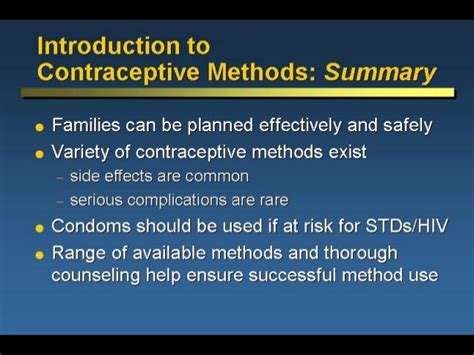
Contraception methods can be broadly categorized into several groups, including hormonal, barrier, and surgical methods. Each type has its unique characteristics, advantages, and disadvantages. Hormonal methods, such as birth control pills and patches, work by regulating the body's hormonal balance to prevent ovulation. Barrier methods, including condoms and diaphragms, create a physical barrier to prevent sperm from reaching the egg. Surgical methods, like vasectomy and tubal ligation, involve permanent procedures to prevent pregnancy.
Hormonal Contraception Methods
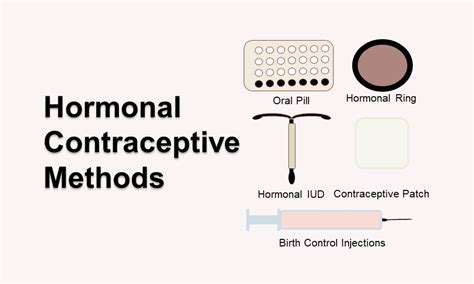
Hormonal contraception methods are a popular choice among individuals, offering a range of benefits, including convenience, effectiveness, and reduced menstrual cramps. These methods typically contain synthetic hormones, such as estrogen and progesterone, which regulate the body's hormonal balance to prevent ovulation. Some common hormonal contraception methods include:
- Birth control pills: Oral contraceptives that contain synthetic hormones to prevent ovulation.
- Contraceptive patches: Transdermal patches that release hormones to prevent ovulation.
- Contraceptive rings: Vaginal rings that release hormones to prevent ovulation.
- Intrauterine devices (IUDs): Small devices inserted into the uterus to release hormones and prevent fertilization.
Benefits of Hormonal Contraception

Hormonal contraception methods offer several benefits, including:
- High effectiveness in preventing pregnancy
- Reduced menstrual cramps and bleeding
- Improved acne and skin health
- Decreased risk of ovarian and endometrial cancer
- Increased convenience and flexibility
Barrier Contraception Methods
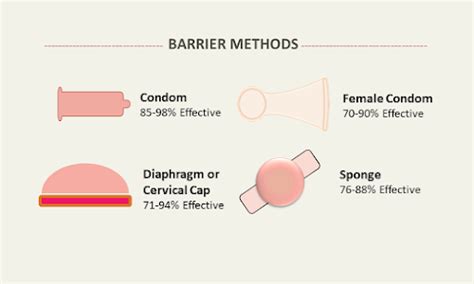
Barrier contraception methods create a physical barrier to prevent sperm from reaching the egg. These methods are often used in conjunction with other forms of contraception, such as hormonal methods, to provide additional protection against pregnancy and STIs. Some common barrier contraception methods include:
- Condoms: Latex or polyurethane sheaths that fit over the penis to prevent sperm from reaching the egg.
- Diaphragms: Flexible, dome-shaped devices inserted into the vagina to cover the cervix and prevent sperm from entering the uterus.
- Cervical caps: Small, thimble-shaped devices that fit over the cervix to prevent sperm from entering the uterus.
- Spermicides: Chemicals that kill sperm, often used in conjunction with barrier methods.
Benefits of Barrier Contraception
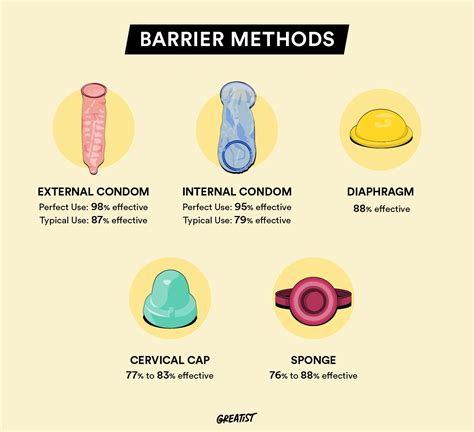
Barrier contraception methods offer several benefits, including:
- Protection against STIs, such as chlamydia and gonorrhea
- Easy to use and accessible
- No hormonal side effects
- Can be used during breastfeeding
- Increased control and empowerment
Surgical Contraception Methods
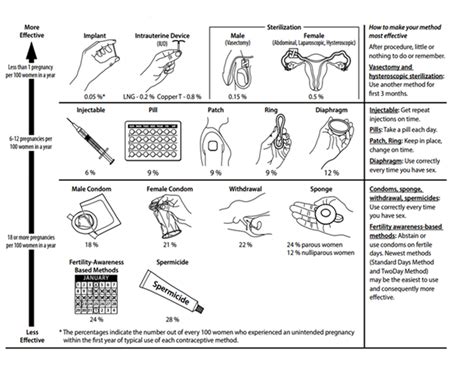
Surgical contraception methods involve permanent procedures to prevent pregnancy. These methods are often considered by individuals who have completed their families or are certain they do not want to become pregnant in the future. Some common surgical contraception methods include:
- Vasectomy: A procedure that cuts or blocks the vas deferens to prevent sperm from reaching the semen.
- Tubal ligation: A procedure that cuts or blocks the fallopian tubes to prevent eggs from reaching the uterus.
- Essure: A procedure that inserts small coils into the fallopian tubes to block fertilization.
Benefits of Surgical Contraception
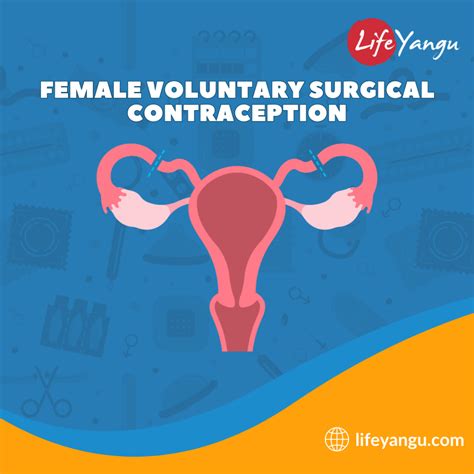
Surgical contraception methods offer several benefits, including:
- Permanent and highly effective
- No hormonal side effects
- No need to remember to take or use contraception
- Increased convenience and freedom
- Can be a cost-effective option in the long run
Natural Family Planning Methods

Natural family planning methods involve tracking the body's natural cycles to prevent pregnancy. These methods are often used by individuals who prefer a non-hormonal, non-invasive approach to contraception. Some common natural family planning methods include:
- Fertility awareness method (FAM): Tracking the menstrual cycle to identify fertile and infertile days.
- Basal body temperature method: Tracking changes in basal body temperature to identify ovulation.
- Cervical mucus method: Observing changes in cervical mucus to identify fertile and infertile days.
Benefits of Natural Family Planning

Natural family planning methods offer several benefits, including:
- No hormonal side effects
- Increased awareness and understanding of the body's natural cycles
- Low cost and accessibility
- Can be used in conjunction with other forms of contraception
- Promotes a healthy and holistic approach to reproductive health
What is the most effective form of contraception?
+The most effective form of contraception is often considered to be hormonal methods, such as birth control pills and IUDs, which have a failure rate of less than 1%. However, the effectiveness of any contraceptive method depends on proper use and individual factors.
Can I use multiple forms of contraception at the same time?
+Yes, using multiple forms of contraception at the same time can provide additional protection against pregnancy and STIs. For example, using a hormonal method in conjunction with a barrier method can increase effectiveness and provide extra protection.
How do I choose the right contraceptive method for me?
+Choosing the right contraceptive method depends on individual factors, such as medical history, lifestyle, and personal preferences. It's essential to consult with a healthcare provider to discuss options and determine the best method for your unique needs and circumstances.
As we conclude our exploration of the various types of contraception, it's essential to remember that each individual's needs and preferences are unique. By educating oneself on the different forms of contraception, individuals can make informed decisions about their reproductive health, selecting the method that best suits their lifestyle, values, and priorities. We invite you to share your thoughts and experiences with contraception, and to continue the conversation on social media using relevant hashtags. Together, we can promote a culture of reproductive health and empowerment, ensuring that individuals have access to the information and resources they need to make informed choices about their bodies and lives.
